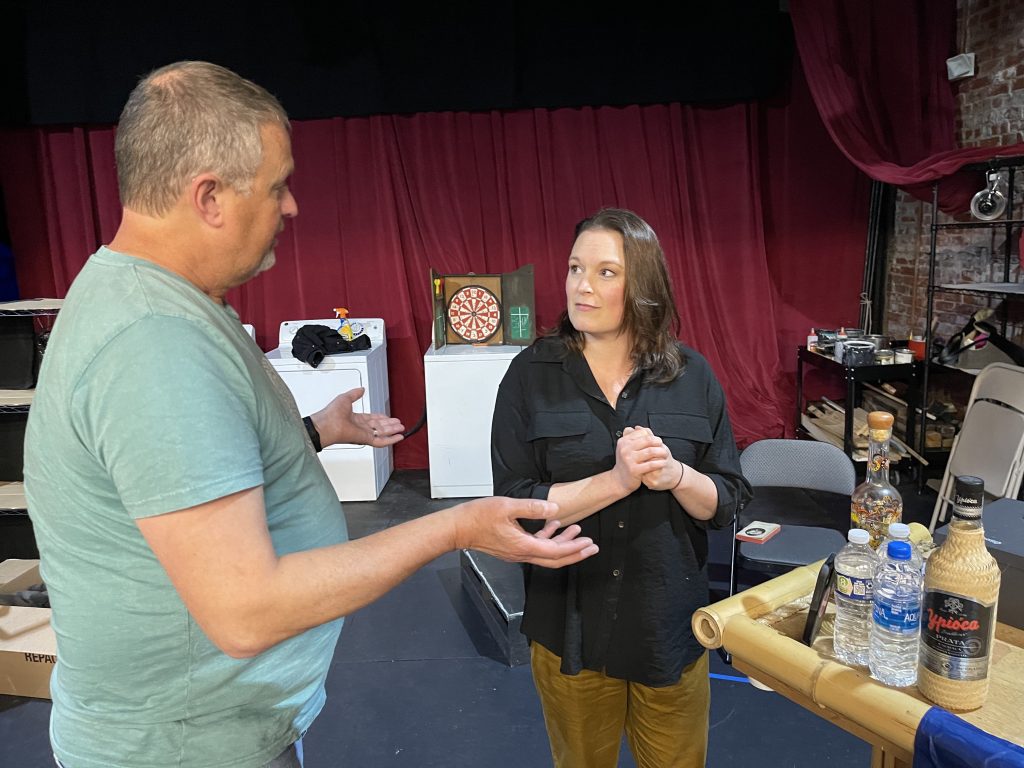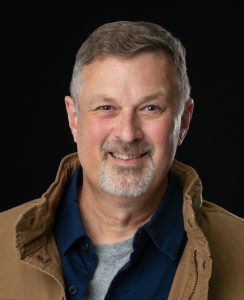
Eric Bryant & Carrie Schlatter – Courtesy of Southbank Theatre Company. Used with permission.
The last time I saw actor-director Eric Bryant in person was a few weeks ago at a Southbank Theatre Company benefit. A board member of the organization, he was manning the check-in table when I arrived at the event. It wasn’t until he addressed the crowd later to announce that he is directing the group’s upcoming show, “Natural Shocks,” that I realized he was wearing a kilt. I have always thought it must take a lot of self-confidence for a man to wear a kilt in these parts, so I was intrigued by his fashion choice. That, plus Bryant’s comments about the drama, which deals with topics that many women face such as domestic abuse and the issue of gun violence, piqued my interest, so I reached out to him for an interview.
Recently, via Zoom and email, I communicated with Bryant about his theatre experience, Southbank Theatre Company, and his work on “Natural Shocks.” Below is a transcript of our conservation.

Eric Bryant – Courtesy of Antonio Chapital. Used with permission.
Tell me about your background.
I was a student of J. Edgar and Dorothy Webb at IUPUI and learned a lot from both. I moved to New York in the early 1980s where I enrolled at HB Studio. I studied with some fantastic teachers: Carol Rosenfeld, Elizabeth Dillon, Sandy Dennis, and met my longtime friend and mentor, Joe Daly, who taught stage fencing. I auditioned to get into Uta Hagen’s class. The first time, I didn’t make it. The second time, she had asked me to audition after seeing me in something at the HB Playwrights Foundation, but I had gotten cast in a tour of “The Three Musketeers,” so I didn’t get a chance to work with Ms. Hagen directly. I did some work in New York, all way-the-hell-off-Broadway and did a couple of non-union national tours. When I returned from my last tour, I saw that Circle Rep LAB was holding a class focusing on the work of Lanford Wilson. I was a huge fan of his writing, so I signed up with my girlfriend at the time. The class was being taught by Michael Warren Powell, who was not only the Artistic Director of Circle Rep at the time, but also a longtime friend of Lanford’s. They had moved to New York together. Lanford ended up attending one of the final classes and critiqued the scenes that we were doing. He was very generous and loved actors. The next week, he showed up again with a first draft of a new play he was working on and asked if we would do a cold reading of it, so he could hear it. What a treat!
Tell me about your family.
I grew up in a blended family on the east side of Indy and went to Warren Central High School. I did some Readers Theater there but didn’t get involved in full stage productions until college. I was an only child, then my mom married my stepdad, who had six kids. They got married after just two weeks of dating! They’re still together after 51 years. I met my wife Julie at a fundraising event shortly after September 11, 2001, in New York. Friends of mine I had come with had left, but I was having a good time and was dancing on the floor by myself. Julie saw me, and instead of thinking “LOSER!” interpreted my solo dancing as confidence, and we started dating after that. I convinced her to move back to Indiana with me in 2004 just before we got married. I have an adult son from a previous relationship, and then a few years ago, Julie asked if I would be open to becoming a foster parent. We had tried to have kids of our own but weren’t able to. We ended up fostering a sibling group, two girls and a boy, and then about five years ago, we made it official and adopted them. My son is now 40 with kids of his own – our oldest granddaughter is 15. Our oldest daughter, 21, is living in Oregon and has a three-year-old and another son on the way. Our 18-year-old daughter is a senior this year and is a fantastic rugby player. She’s considering becoming a cop or a firefighter. Our 16-year-old son just started driving and is also a good athlete. He’s been involved in Ninja competition, gymnastics, wrestling, soccer and now is more focused on being a teenage boy. He’s planning to go to college to study aerospace or astrophysics. We’ve also had a series of rescue dogs over the years. Right now, we have a couple of older black labs and a very bossy little 14-year-old Corgi mix.
Why did you join the Southbank Theatre Company Board of directors?
Doug Powers had asked me to take part in a production of “The Profession,” one of Marcia Eppich-Harris’ (Southbank founder) plays, just before COVID hit. I think we had had one table read, and then everything went on lockdown. I started attending some of the Indiana Playwrights Circle Wednesday night readings. When Doug was directing “Seneca and the Soul of Nero” for Southbank, he asked me to come in and choreograph some of violence. I stayed in touch with Marcia because I liked the work she was doing, and new play development is something that I’m really interested in. I called her with a crazy idea to create a platform to work with emerging playwrights to help develop their work. IPC does that to an extent, but often the feedback is from other writers. Marcia mentioned that she wanted to start hearing more feedback from the actors because she values their point of view, so we agreed to me working with her on her latest version of “The Profession” so that it was in a good place for the full production this past fall. I recommended doing a formal staged reading with an invited audience, which is something I used to be a part of in New York. She liked the idea, and we also knew that in addition to the actor feedback during rehearsal, she would be open to audience feedback after the reading, so we arranged a moderated (by me) talkback. It was during this time of working on that staged reading that Marcia asked me to join the Board as the person overseeing new play development
Describe “Natural Shocks”
The play, by Lauren Gunderson, is based on the “To be or not to be” speech from “Hamlet.” It is described as “a one-woman show inside a tornado.” The story centers around Angela, a 40-something woman, who has retreated to her basement to wait out a storm. We completely shatter the fourth wall when she speaks directly to the audience, talking about her life, as well as talking about the choices she has had to make, and what the consequences of both action and inaction are (the tie-in to “Hamlet”). I want to emphasize that it is a comedy…until it isn’t one.
How did you come to direct it?
I wasn’t looking for a project, having just directed a staged reading of Marcia’s (Eppich-Harris) play “The Profession,” and being in the process of opening “Lysistrata” as part of Bard Fest. I was on a Zoom call with the Board for Southbank, and Marcia mentioned that between “The Profession,” planning the gala, and several other projects she was working on, she was trying to find someone to direct this play. I asked her to send me the script, and after an initial read through, I had a visceral reaction to the character and the situation. The journey that Angela takes us on is remarkable, and the last few pages literally took my breath away. I immediately had a strong vision of how the play could be staged, so I agreed to get involved.
Why did you cast Carrie Ann Schlatter in play?
It was interesting. Marcia had opened video-submission auditions prior to my coming on board, so she already had a handful of interested actors. And I have to say, it was not an easy decision. We have a lot of talent in our community, and women who were clearly passionate about the play. I had never worked with Carrie before. I knew her name and reputation, but nothing else. I did know that she had done one-woman plays before, which was not something I was necessarily looking for, but experience like that is valuable. Anyway, I saw her audition tape, and I liked that she portrayed both strength and vulnerability, qualities which I wanted Angela to have. I emailed her to set up a follow-up meeting with some adjustments that I asked her to make, and she completely nailed it. I also appreciated that during that call-back she was asking some very smart questions about the direction I saw the character going in and offered some of her own insights. At the end of the day, I felt that she was the best person for the role.
What is it like directing Carrie?
When it was announced that she was doing the role, a friend said, “You’d better bring your A-game – Carrie’s great!” And he wasn’t kidding. At our first read through, she was completely prepared, had clearly done some script work, and kind of surprised Marcia and me with how fully she had already embraced Angela. We did a couple of rehearsals of just table work, talking about the character, the circumstances that she finds herself in, the arc of the character, and some of the more difficult transitional moments. Carrie has an amazing work ethic and is very creative and playful during the process, something that I respond to both as an actor and a director. She shows up with ideas but is open to suggestions. Plus, she’s fearless when it comes to being completely vulnerable onstage. Honestly, I’m not sure I had to do much “directing.” Carrie’s the type of actor that all you need to say is, “Why don’t you try picking up this or that prop,” and she instinctively uses it to reveal something about the character’s inner life.
As a male, what do you bring to the table as the director?
I grew up with strong female role models. My grandmother, my mother, my sisters. I married a strong woman, who comes from a family of strong women. And while I cannot fully understand or relate to the experience of being a woman, I see how women are often treated in our society, even currently. Plus, I listen. I’m open to changing my male viewpoint based on women’s experiences. I think what I must bring to the table as a director, regardless of whether the cast is male, female, non-binary, trans, etc., is that first and foremost my training is as an actor. I think that’s one reason why I’m drawn to plays with smaller casts. I love playing with the relationships between the characters and working with the circumstances of the play to best illuminate the story we are trying to tell. If you asked me to direct something with a large cast, like a Shakespeare play, I’d be lost. I have appreciation and respect for people who can do that well, but that’s not where my interest lies.
What is the show’s message?
If I had to sum it up in a word, it would be “survival.”
Why should people come to see it?
Because it’s entertaining, and Carrie is amazing. It’s also an important story that a lot of people can relate to.
For tickets and information about “Natural Shocks” which runs November 10-20 at Fonseca Theatre Company, visit southbanktheatre.org.





